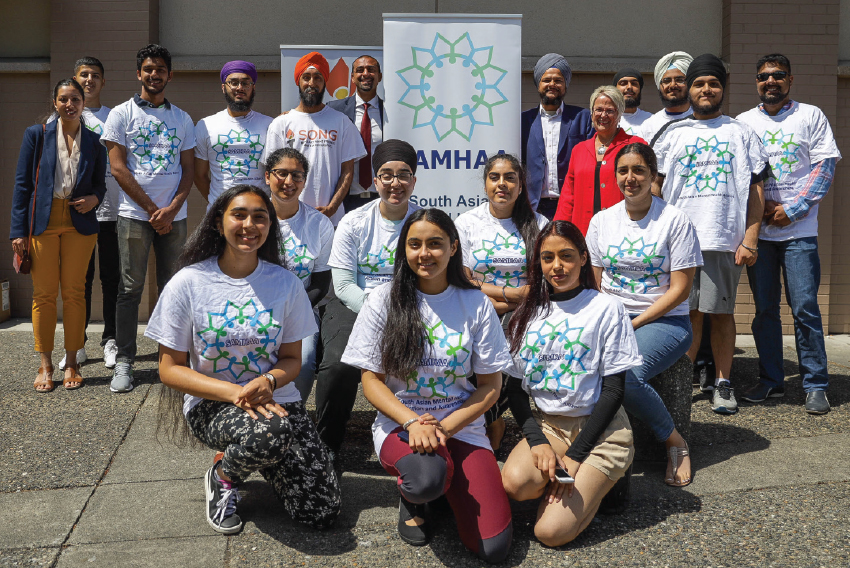The South Asian Youth Mental Health (SAYMH) team
From the "Youth Facing Health Inequities" issue of Visions Journal, 2020, 15 (3), pp. 36-37

South Asians have been a part of Canadian society for over 100 years. Within that time, the community has grown and contributed to all public and private sectors, establishing itself as a vital and vibrant part of the Canadian cultural landscape. Yet like many others in British Columbia and across the country, those in the South Asian community who are struggling with mental illness are often unwilling or unable to access safe and appropriate services.
In the case of many first-generation South Asian Canadians and immigrant families, language barriers and cultural differences, experiences of systemic racism and discrimination and the struggles that are part of settlement have historically made it difficult for those seeking help to navigate what is often, unfortunately, a complex system.
Sofia Walia is the Project Coordinator for South Asian Mental Health Alliance (SAMHAA), a non-profit society founded in 2010. In Walia's words, SAMHAA’s aim is to "bridge the gap between services and the community, as well as empowering individuals themselves to become advocates and ambassadors for mental health and well-being."
Raman Khaira is an advocate and frontline worker with homeless individuals in Surrey, a director of Guru Nana's Free Kitchen and a founding member of SAMHAA. Khaira points out that when SAMHAA was founded in 2010, many in the South Asian community weren't even prepared to have a conversation about mental health issues. Since then, "the stigma [has] decreased, the awareness increased, to an extent that now people are ready to push the conversation forward."
In June 2019, SAMHAA was awarded a grant of $112,000 by the BC Ministry of Mental Health and Addictions to deliver culturally safe, language-specific mental health and addictions training to youth across the province. In the South Asian Youth Mental Health (SAYMH) program, young people become mental health ambassadors and are given training and mentoring in cultural safety, overdose crisis education, health-care system navigation skills and learning how to use the arts to promote dialogue about mental health.
SAYMH brings together community organizations, advocates, individuals with lived experience and professionals from various disciplines to share their knowledge, skills, advice and experience. Together they facilitate workshops that provide young people with the opportunity to develop the skills they need to create health promotion and stigma education and reduction programs for various community contexts. These innovative programs are then planned, produced and delivered by the SAYMH ambassadors themselves.
For the first part of the SAYMH program, SAMHAA received significant support from Gurdwara Dasmesh Darbar, which may be the first gurdwara (Sikh temple and community centre) in North America to establish an in-house wellness centre with counselling and mental health services. In partnership with Moving Forward Family Services (an innovative non-profit agency that provides counselling to anyone who needs it in Surrey, BC, and the surrounding areas), the Dasmesh Wellness Centre offers a unique model of community engagement and healing.
An elementary school teacher and a cofounder of SONG (Seeking Oneness for the Next Generation), a collaborating partner in the first phase, Harman S. Pandher explains that the SAYMH program empowers youth with the skills to respond effectively to mental health crises and in situations of addiction and overdose. The program aims to "create a positive ripple effect in homes, families and throughout the community."
The second phase of the SAYMH training focused on international students. One Voice Canada founder Dupinder K. Saran, a community leader and nurse for over 21 years, points out that "far away from their home countries and cultures, international students deal with a multitude of settlement, education and employment-related hurdles and may also face exploitation, which makes them more susceptible to mental health challenges."
They say it takes a village to raise a child. In much the same way, it takes a village to build a movement. South Asian Mental Health Alliance is working in collaboration with the Government of BC and Fraser Health Authority on the StopOverdoseBC and Take Home Naloxone awareness campaigns, as well as the Surrey Community Action Team and the South Asian Opioid Crisis Response workgroup.
The stigma reduction and education movement spearheaded by SAMHAA has brought together pioneering organizations from various fields—all of which do incredible work in their respective areas. The third phase of the SAYMH project will focus on local Fijian and Caribbean communities, in collaboration with the 3E Organization, SPARK Foundation and the Canadian Federation of Fiji Organizations.
SAMHAA is determined to continue shining a light on mental health issues, fighting stigma, providing education and advocating for better access to services on a systemic level. The organization will be celebrating its 10th anniversary in 2020 and hopes to train 100 Lower Mainland youth in the SAYMH program by 2021. SAHMHAA invites the entire community to participate.
For more information on SAMHAA, visit www.samhaa.org or check us out on social media as @SouthAsianMH and "South Asian Mental Health."
About the author
Born and raised in British Columbia, Kulpreet is an educator, public speaker and the founder and director of South Asian Mental Health Alliance (SAMHAA)
